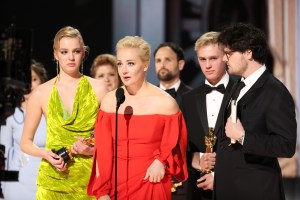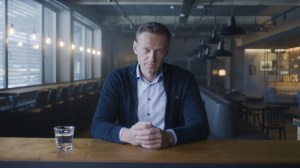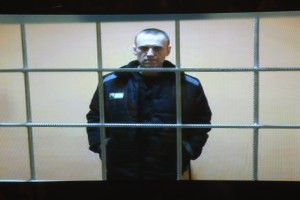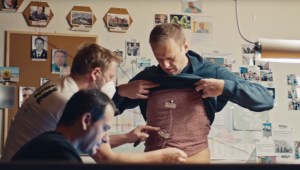Director Daniel Roher is making no secret who he blames for the death behind bars of Russian opposition leader Alexei Navalny, focus of his 2023 Oscar-winning documentary Navalny.
“[Russian President Vladimir] Putin is responsible for his death. That much is clear,” he told Deadline. “The particulars of how and those sorts of questions I don’t think we know yet, but to me, it’s obvious who is responsible.”
Russia’s Federal Penitentiary Service announced Friday that Navalny, 47, had died in a prison in the Arctic Circle, saying he fell ill after taking a walk in the facility. Navalny had been under lock and key at various prisons in Russia after he returned to his homeland in 2021 from Germany, where he had undergone emergency treatment after a near-fatal poisoning attack (an assassination attempt also widely blamed on the Kremlin). Just a day earlier, Navalny had made a court appearance by video from prison, appearing healthy and even making jokes with court officials.
“In time, we will learn the details” of Navalny’s death, Roher predicted. “One thing you can count on is the Russian security service as being completely inept and moronic, as we saw in the documentary. And so sooner or later we’ll figure out the details. And sooner or later Putin’s going to get what’s coming to him in this life or the next. And I hope it’s sooner than later.”
Alexei Navalny is miked up to secretly record a conversation with his suspected poisoner in ‘Navalny.’ Christo Grosev is in foreground.
Fathom Events/Everett Collection
In the documentary, from CNN Films and streaming service Max, Navalny investigates his own poisoning, with help from Bellingcat journalist Christo Grosev. In one extraordinary scene, Navalny impersonates a Russian official in a call to a Kremlin-connected chemical weapons agent, tricking him into confessing details of the murder plot.
In one of the emotional highlights from the Oscar telecast last March, Roher and the film’s producers accepted the Academy Award alongside Navalny’s wife, Yulia Navalnaya, and the couple’s two children. After dedicating the award to Navalny and “all political prisoners around the world,” Roher invited Yulia to speak.

Yulia Navalnaya, flanked by her children, speaks at the 2023 Academy Awards. Director Daniel Roher is to her far left.
ABC via Getty Images
“My husband is in prison just for telling the truth. My husband is in prison just for defending democracy,” she told the Oscar audience. “Alexei, I’m dreaming of the day when you will be free and our country will be free. Stay strong.”
Navalny emerged as a threat to Putin’s autocratic rule in the 2000s by crusading against Kremlin corruption, a campaign that earned growing public support. His charisma and ability to connect with ordinary Russians contrasted with Putin’s buttoned-down authoritarian style. Roher believes Navalny’s political movement will not perish with him.

‘Navalny’
CNN Films
“I think Alexei designed his organization to live on and continue in the event of his death,” he said. “And it is my hope that this tragedy only lights a fire under the asses of every good Russian who supported Navalny, anyone who has sympathies for the opposition. It’s really sad. I hope that Navalny’s name becomes synonymous with courage and the resilience that he has shown for the last few years — for his entire professional life. And to that point, I hope that when the beautiful Russia of the future finally does come, history will remember him as a pivotal figure in the fight for freedom.”
Roher said he got the news of Navalny’s death early this morning.
“We have a new baby in the house, so we’re getting up at night a lot. My wife woke me up at 4 in the morning and she told me that Navalny only had died,” he said. “I just was like, ‘Oh God, no, no, no, no, no, no. Don’t be true. Don’t be true.’ It seemed, ‘How could this be possible? Why now? Why today? Why in this moment?’ …I called immediately Christo Grosev… I said, ‘Is it true?’ And he said, ‘It’s true.’ And I think I was in shock.”

Alexei Navalny in Moscow’s City Court on May 24, 2022
Contributor/Getty Images
Navalny’s family and supporters had consistently expressed concerns about the conditions under which he was held in prison, often in solitary confinement, and whether he had access to proper medical care.
Regarding his death, Roher said, “Anyone who’s followed the Navalny story or is aware of who he is, this is something that has sort of been a possibility for Alexei. And in spite of that, I still am gutted and shocked.”
What may never be adequately answered is why Navalny chose to return to Russia in 2021 from effective exile in Germany. In the film, it appears he was motivated by a sense of moral obligation to be with his people.
“We were afraid of what might happen [when he returned],” Roher said. “The future was uncertain. We weren’t sure what would happen when he arrived in Russia. And, of course, now our worst fears have actualized.”
The director said Navalny’s decision to go back to Russia “is a point that is for history to litigate. It’s easy, with hindsight being 20-20, for us to examine and perhaps even criticize that decision. But at the end of the day, I’m not in a place to speculate on why… or if he should have done that. All I can speak to is the sadness that I feel and the pain that I’m sure his family is feeling. This is a loss for the world and it really does feel like the light has gone out today.”

